"Fifty years from now there will be two kinds of seminaries: former and endowed."
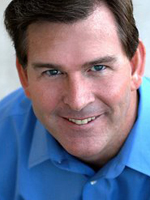 |
| Jay McSwain (MDC TODAY/PLACE MINISTRIES) |
These words, spoken by a seminary president several years ago, continue to ring in the ears of two of Golden Gate Baptist Theological Seminary trustees, Jay McSwain and Joe Taylor. As members of the board's advancement committee, both are committed to doing their part in ensuring not only their school's survival, but its excellence and impact. And they are having fun in the process.
Fundraising is a concern shared by the boards of all theological schools, and some trustees even find it rewarding. At least that's what the experiences of board members at four diverse schools suggest -- Golden Gate, the Interdenominational Theological Center (ITC), Vancouver School of Theology, and the University of Dubuque Theological Seminary. ITC and Vancouver are in the challenging process of redefining themselves and refocusing their fundraising efforts. Golden Gate and Dubuque, their mission fully articulated, are concentrating on bringing in the money to support that mission. For all their differences, the four schools are clear on one point, and that is the important role that the board plays in the success of the fundraising program.
It's about leadership
Golden Gate Baptist Theological Seminary, one of the six seminaries of the Southern Baptist Convention, is blessed with a committed and involved institutional advancement committee. The Rev. Joe Taylor and Jay McSwain are especially energized by the vision of Golden Gate's president, the Rev. Jeff Iorg, who arrived in 2004. And both are impressed not only with the competence of Thomas Jones, vice president for institutional advancement, but with his empathy and genuine concern for people.
Taylor, chair of the board's eight-member advancement committee and pastor of South Reno Baptist Church in Reno, Nevada, was elected to Golden Gate's board soon after he received his doctor of ministry degree from the school. "When the board approached me about being on the institutional advancement committee, what appealed to me the most is that it's where I fit best," he says. Convinced that Golden Gate is "an awesome school, one of the best things going on the West Coast," Taylor finds joy in using his gift for communication to introduce people to Iorg's vision and the school's mission.
Fellow committee member Jay McSwain is in an advantageous position for helping the school financially. His job as founder and president of Place Ministries, which helps laypeople find and use their special gifts for ministry, puts him in contact with many large-church pastors. His family, which owns one of the largest construction companies in the United States, dedicates 10 percent of its yearly income to supporting various institutions and charities. McSwain became acquainted with Golden Gate by financially helping a friend who studied there for his doctorate. He was so impressed with the school that he and his wife, then in their early 30s, left their home in Atlanta to spend two years working for Golden Gate as full-time volunteers.
When Iorg became president, half a dozen years after the couple had returned to Atlanta, McSwain accepted Iorg's invitation to become a board member. "It's the leadership of an organization that makes you want to commit your time, money, and resources to it," McSwain says. Taylor echoes the sentiment. "Dr. Iorg knows where we need to go and how we can get there. It's fun to follow someone like that."
Three kinds of people make up Golden Gate's advancement committee, McSwain says: pastors, denominational ministry leaders, and laypeople with significant financial resources. As a member of the third group, McSwain finds satisfaction in being part of his family's decisions to provide major gifts to the school in support of specific seminary projects. He and Iorg dream of establishing a school of ministry and leadership at Golden Gate, to be the denomination's major research base for leadership training.
Taylor takes part in a fundraising project that involves most of Golden Gate's board members: a series of banquets in different cities around the country. While Jones and his development staff take care of the logistics of setting up the banquets, trustees contact people, suggest names of potential donors, give their testimonies, serve as table hosts, and act as masters of ceremonies for these events. This level of board involvement is new for the school.
Taylor defines the advancement committee's job as overseeing and encouraging the fundraising effort entrusted to a competent development team. "I ask Dr. Jones and his staff at every board or committee meeting, ‘What do we trustees need to be doing to help you guys succeed?'" Both Taylor and McSwain have taken the time needed to understand the school's mission and its fundraising program. They've followed their own advice to "develop a very good relationship with the paid staff that's doing the day-to-day work." And the seminary is profiting from their -- and the rest of the advancement committee's -- leadership.
It's about new ideas
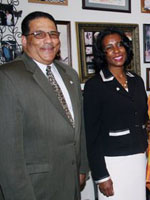 |
| Interdenominational Theological Center president Michael Battle with Sandra Yates (above) and Ann and James Gavin with Marianne Clarke (below) at a recent fundraising reception at the Gavin home. (ITC) |
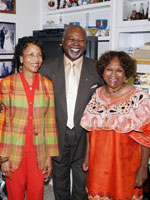 |
While Golden Gate is characterized by passionate commitment to a fully realized vision, Atlanta's Interdenominational Theological Center, a consortium of six historically black seminaries, has had to find creative ways to increase unrestricted funding. Two new initiatives -- one, called TheoEcology, led by a trustee and the other, private fundraising receptions, spearheaded by a volunteer turned part-time staff member -- have increased visibility and jumpstarted funding.
That ITC's entire mission is adequately funded depends on the leadership of Sandra Yates, the consortium's vice president for institutional advancement. When Yates came to her post a year and a half ago, she immediately tackled such basic tasks as opening communication with the school's alumni, approaching foundations for grants, and meeting with potential donors. The board does its part by helping open the door to potential gifts. The advancement committee solicits fellow board members to give to the ITC, helping Yates to ensure that all members give. "Most people don't understand how difficult and complex fundraising is," Yates says. "But the development committee members have a strong understanding." Strengthening the impact of this valuable committee is one of the immediate goals she has set for herself.
Marianne Clarke, a former New York politician, came to ITC with her own ideas of how to increase financial support and community presence. While Yates focused on the nuts and bolts of fundraising, she gave Clarke greater and greater freedom to work on gaining access to people in the community who might support the ITC. The result has been a series of receptions in the homes of well-connected friends of the institution. The hosts invite their own friends and acquaintances, create a collegial environment at the event, and then solicit those in attendance to support the center. Clarke's endeavors were so successful in bringing in those unrestricted dollars that she joined the staff part time. A self-described "people person" who seems to know everyone, Clarke has also helped make an annual awards dinner into an exceptional success, bringing in a sixth of ITC's fundraising income this year.
ITC is in the heady first stages of embracing an energizing new mission: TheoEcology. Recently added to the list of the center's nine strategic goals, TheoEcology is a name coined by the consortium's president, the Rev. Michael A. Battle -- the ITC has even registered the word as a service mark. Dr. Battle calls it a chance for the institution to fulfill its mission of educating Christian leaders while also "taking a strong stand of support for environmental justice and responsibility."
The effort to marry ecology and theology began with the encouragement of Paula Gordon, co-chair of the institutional advancement committee. "TheoEcology is a splendid, spectacular example of getting institutional advancement right," she says. "It's very easy for people to get the cart and the horse badly mixed up by focusing first on money. But we need to begin by asking, ‘What does the world need from us at this critical moment?' When we concentrate on that, the money follows."
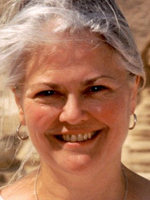 |
| Paula Gordon (BILL RUSSELL) |
Gordon had become convinced that the immensity of today's environmental issues affects every pressing need of the churches and people that ITC serves, and President Battle was open to her concern. He included a widely respected faculty member in their first discussion, and together the three brainstormed ways to bring the environmental movement and black churches together. When she brought TheoEcology before the board's 38 members in October 2006, they voted unanimously to support it as one of the school's strategic emphases.
The vision of TheoEcology has spread throughout the school. The ITC faculty has begun a three-year process of rewriting the curriculum to include the new ecological emphasis; changes are being made to the physical plant; and students are excited and involved. Though the jury is still out, TheoEcology seems on its way to becoming an important strand in ITC's uniqueness, shaping the kind of students it attracts, the pastors it produces, and the influence it has on its constituent churches.
The blending of ecology and theology is especially appropriate for an African-American theological school, Gordon says. It fits the institutional strengths of black churches, which still have exceptional moral authority and the experience of providing leadership in troubled times. The people ITC serves tend to be the hardest hit by environmental problems. TheoEcology also meshes with the consortium's history of leadership in liberation theology. And following good environmental principles can save people -- and schools -- money.
But has Gordon's conviction that "money follows the big idea" been proved right? To date, the answer seems to be a qualified "yes." Shortly after the school adopted TheoEcology as its ninth strategic goal, it received a substantial grant to launch an exploration of when and how to weave the new emphasis into the center's mission.
Key players in the organization are convinced that the consortium's financial health depends on diversifying income and visibility. ITC's leaders hope that the new emphasis on ecological stewardship, along with those receptions in the homes of the center's friends, will do both.
It's about careful policies
Like ITC, Canada's Vancouver School of Theology is in the midst of a major transition. The school has transitioned from a 27-member board of governors with 11 committees to a 14-member board with only four -- the development committee was among those that were phased out. The new board, launched in February 2007, follows the Carver model of Policy Governance. It meets bimonthly rather than three times a year and devotes itself to policy issues, leaving day-to-day management of the school to the principal and dean, the Rev. Wendy Fletcher.
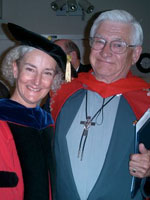 |
| Paula Sampson and her husband, Ian MacKenzie (VANCOUVER SCHOOL OF THEOLOGY) |
It's still unclear how the new board, ten of whose members represent the three denominations the seminary serves -- Anglican, United Church of Canada, and Presbyterian -- will relate to the development staff, as the board is still formulating its fundraising policy. But director of development Corinne Rogers and at-large board member Paula Sampson have some ideas about how they would like the new board to function in supporting the fundraising effort.
"I am strongly committed to the idea that the board plays a huge role in fundraising," Rogers says, and so it is not surprising that she would be pleased if the new board would decide to reinstate a development committee. But with or without a committee of her own, Rogers is committed to working with individual board members. "I try to keep the message in front of the board that fundraising is an important part of their role," she says, "because they are the strongest ambassadors for the school."
It is especially helpful that Dr. Fletcher, the principal and dean, has invited Rogers to attend all board meetings, making her the only faculty or staff member asked to do so. This provides Rogers with the opportunity to establish relationships with board members and to let them know what she is doing and how they can be involved with fundraising. Knowing Rogers gives board members the confidence to put her in contact with people who can give.
All of the board members support the school financially, and Rogers looks forward to offering further education to the board about their role in encouraging people from their various spheres of influence to give. Trustees at the school have always been willing to connect her with people who have the ability to make major gifts, and she is confident that they will continue do so in the future.
Trustee Paula Sampson, an Anglican priest who has made the transition from Vancouver's old board to the new, shares Rogers' conviction that fundraising will have to be a concern under the new governance model. Rogers makes getting involved easy for trustees, she says. "I've found that all I have to do is to approach Corinne with a name or an idea, and she will do the followup. I've been impressed with how well she's done that." Sampson expects that the smaller, more intimate board will become especially committed to telling the school's story, and that the work the board is doing in setting policy and defining the school's mission is sure to energize the fundraising effort. "The most important thing that board members can do is to communicate and model commitment to the school," Sampson says. "It's catching, and when people catch it, all kinds of wonderful things happen."
It's about clarity of purpose
The University of Dubuque Theological Seminary is enjoying a period of stability after a time of great change. Led by a new president and the board of trustees, the university redefined its mission some ten years ago in response to declining enrollments and financial shortfalls in the undergraduate college. The steadiness of Dubuque's 150-year-old theology school, the smallest of the ten seminaries of the Presbyterian Church (USA), played a significant role in how the university revisioned its mission and achieved its present equilibrium.
When Dubuque faced its economic crisis in the late 1990s, the board of trustees was forced to take drastic action. In addition to trimming programs and staff, the board thought hard about the school's identity. In a time when most universities were downplaying their denominational ties, the University of Dubuque decided to reaffirm its calling as a college of the church. In keeping with that emphasis, the school has recently added a director of church relations to its development staff -- a move that serves both the undergraduate and the seminary population, says John Puotinen, senior vice president for advancement.
The undergraduate school also reaffirmed and strengthened its focus toward a population neglected by most colleges -- students with potential for academic success but who do not have a family history of higher education. Both emphases grew out of the school's history and its assessment of what it had been doing especially well. That the board then selected the dean of the seminary, the Rev. Jeffrey F. Bullock, to be the university's new president underscores the important role that the seminary has played in the university.
In the years since Bullock took office, the full-time undergraduate student population has doubled. The endowment, a paltry $16 million just ten years ago, is projected to reach $90 million by the end of the 2007–08 academic year and is climbing toward the board-approved base goal of $150 million. The university is in the final year of the largest capital campaign in its 154-year history, which aims to raise $125 million. Because the university's component schools are under one financial umbrella, there is no separate fundraising effort for the seminary, though designated gifts are often earmarked for it. In the midst of the university's remarkable turnaround, the seminary is thriving.
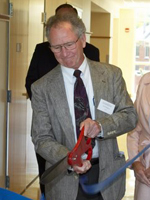 |
| Ed Hannon (UNIVERSITY OF DUBUQUE) |
Soon after the mission was defined, the University of Dubuque received a number of large gifts, including a major donation to begin a new program aimed at character building, a $26 million gift from an alumnus who had profited from the school's commitment to helping first-generation students, and a $9 million trustee gift to build a new library, followed by another $9 million to build a teaching and learning center. While thrilled by what these commitments have done for the institution, Dr. Edward Hannon, chair of the board development committee and a retired radiologist, is quick to remind the board that fundraising is primarily a process of diligent, day-to-day work using familiar methods, mostly carried out by an excellent development staff supporting an effective president. The board and the development staff's greatest challenge is to establish and maintain a wide base of support, made up of many people who give year after year.
It's about teamwork
Hannon describes himself as a liaison between the board and the university's development staff. The full board meets twice a year, but the development committee meets five times annually. On months without meetings. Hannon visits Puotinen to chat about the development program. "He's really the boss of it," Hannon says. "I just find out what's going on and whether they're encountering any problems, and I try to contribute ideas when I can." Hannon sees his role as being as informed as possible so that he is able to report to the board as a whole.
And, of course, he encourages other board members to give to the school. "Some major foundations look at board and faculty giving, and if only a fourth of the faculty and half of the board give money, they're not going to be impressed. You have to stand there and tell that to the board."
Hannon and Puotinen make a good team, in part because their expectations of each other mesh so well. Puotinen values the interest and support he receives from Hannon, and Hannon appreciates Puotinen's competence and hard work. "I consider the members of the development committee as allies in a work that sometimes can be lonely and isolating," Puotinen says. "Development staff members are on the road a lot, and we often talk to constituents one on one. So it's good to have people who are advocates for advancement activities with the university staff and the rest of the board." From his side, Hannon would advise new development committee chairs to stay in touch with, understand, and respect the "constant hard, complex work of the people who are doing the fundraising."
Both men are deeply committed to the university's mission, and Hannon is especially proud of the seminary's part in it. They agree that, as Puotinen puts it, "people do respond to a well-thought-out and powerful mission that has an impact on student's lives." The development committee plays a key role in making sure that the school's mission and its fundraising efforts mesh. As Hannon sums it up, "year after year, month after month, fundraising comes down to the privilege of talking with people and helping the university's family and friends to envision and invest in the dream."